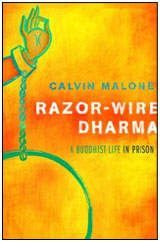Books |
Razor-Wire Dharma: A Buddhist Life in Prison
Calvin Malone
By
Published: Jan 01, 2008
Category:
Spirituality
Razor-Wire Dharma: A Buddhist Life in Prison
Calvin Malone
If you think it’s hard to honor your spiritual beliefs as you walk freely around our troubled but beautiful land, imagine how much harder it would be to live your faith in prison.
Like, in Airway Heights Correctional Center, in Washington State. Where the windows are sealed and the air is rotten. Where the cells are like 60-square-foot closets with two men sharing 2.8 square feet of unobstructed floor space. Where light comes into your cell through two slits, five inches wide and six feet long. Where punks in the gym routinely call you — and it’s not personal – bitch, punk, faggot. Where you take a half step and make a slight turn as someone approaches, because a careless prisoner can so easily be a dead prisoner.
Oh, and you are bi-racial. Your parents met in Germany after World War II; your first language was German. While you’re in jail, your mother thinks she’s buying her first house — and is swindled out of her down payment. While you’re in jail, your father dies of illnesses caused by Agent Orange. While you’re in jail, your drug-addict brother dies.
That’s what Calvin Malone — sentenced to 20 years in 1992 for aggravated assault — is up against when he becomes one of the 2,000 prisoners at Airway Heights. But he has an angel in his pocket; he’s interested in Buddhism, he meditates.
Malone manages to get a job in the library. Christian books were on open shelves there; you had to ask for books about Buddhism. There were few, so Malone went on a writing campaign. About $20,000 in Buddhist literature flowed in. And that was the start of a Buddhist community that eventually extended through Washington’s prisons.
Razor-Wire Dharma is just what its subtitle promises — a straightforward account of a Buddhist doing prison time. You and I might drift and dream. But a Buddhist is compelled to be here now — it was Malone’s obligation, therefore, to be where he was. In jail.
The chapters are character portraits, often of the never-ending pageant of cellmates. One, knowing Malone’s TV is funky, presses the buttons so hard he breaks it. Another throws filthy underwear against the wall and does nothing to remove it when it sticks. Another steals from him. But, over and over, Malone sees through appearances — the men who do him wrong are revealed as his teachers.
“When we take the time to know people around us, it becomes easier to extend compassion and loving-kindness to them,” he writes. “Those who are in prison and seem different are simply people who need the same kindness everyone else is seeking. No matter what they did, who they are, what they look like, or how they act, like all of us, they want to be happy.”
I wish I were as good a man as this convict.
To buy “Razor-Wire Dharma: A Buddhist Life in Prison” from Amazon.com, click here.


